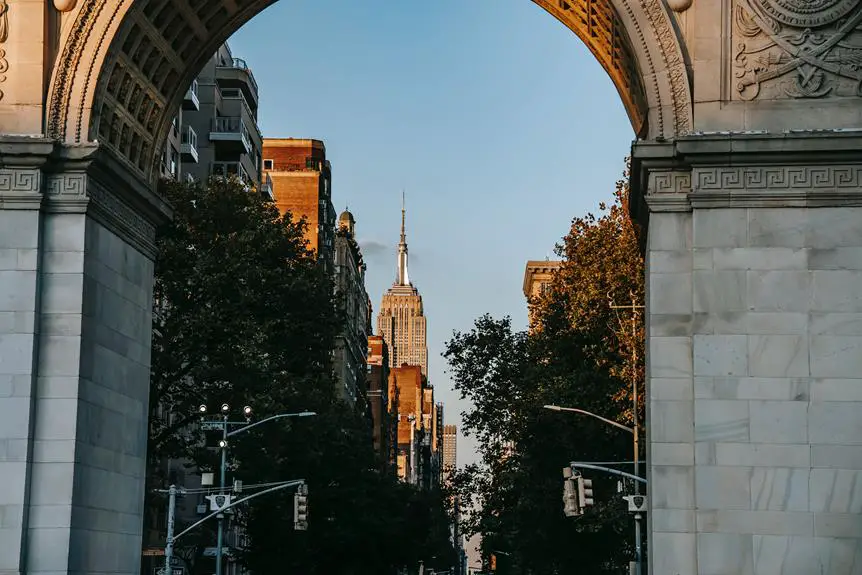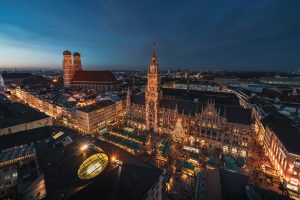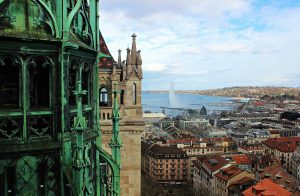Nestled in the heart of the Netherlands lies The Hague, a city that seamlessly intertwines the rich tapestry of history with the sleek lines of modernity.
This thriving metropolis serves as the political heart of the country, housing not only governmental institutions but also the prestigious International Court of Justice.
As you wander through its streets, you will be captivated by the diverse cultural influences and the breathtaking architecture that adorns this vibrant city.
But The Hague is not just a city frozen in time; it also boasts a flourishing contemporary scene that promises to ignite your curiosity.
Join me as we embark on a journey through The Hague, where the past and present converge in a harmonious dance that will leave you yearning for more.
Historical Landmarks
The historical landmarks in The Hague showcase a rich tapestry of architectural styles and cultural influences, providing a glimpse into the city's illustrious past. The preservation of these landmarks is a testament to the city's commitment to safeguarding its architectural heritage for future generations to appreciate and admire.
One notable historical landmark is the Binnenhof, a complex of buildings that houses the Dutch Parliament. Dating back to the 13th century, it is one of the oldest parliamentary buildings in the world. Its Gothic architecture, with its pointed arches and ornate tracery, is a prime example of medieval design. The Binnenhof has witnessed centuries of political history, with its halls echoing the voices of kings, queens, and statesmen.
Another iconic landmark is the Mauritshuis, a 17th-century mansion turned museum. Its classic Dutch Renaissance style, characterized by its stepped gables and decorative brickwork, is a testament to the wealth and prosperity of the Dutch Golden Age. The Mauritshuis is home to masterpieces by Vermeer, Rembrandt, and other Dutch masters, attracting art enthusiasts from around the world.
These historical landmarks not only serve as reminders of the city's past, but they also contribute to its cultural identity and attract tourists from far and wide. The Hague's commitment to historical preservation ensures that future generations can continue to appreciate and be inspired by its architectural heritage.
Government Institutions
The Hague, as the political heart of the Netherlands, is home to a multitude of government institutions that play crucial roles in the country's political landscape. These institutions encompass political decision-making, administrative infrastructure, and diplomatic relations.
From the Binnenhof, which houses the Dutch Parliament and Prime Minister's office, to the numerous ministries and international organizations, The Hague serves as a hub of governance and diplomacy in the Netherlands.
Political Decision-Making
Political decision-making in The Hague is a complex and intricate process that involves multiple government institutions. The city houses several important institutions, including the Dutch Parliament, the Council of State, and various ministries. These institutions play a crucial role in shaping and implementing policies that affect the nation.
One key aspect of political decision-making in The Hague is political lobbying. Lobbying involves individuals or groups attempting to influence policymakers to adopt certain policies or make specific decisions. This process can involve meetings, presentations, and the provision of information or resources to sway decision-makers.
Another important factor in political decision-making is campaign finance. Political parties and candidates require funding to run campaigns and promote their agendas. Regulations regarding campaign finance aim to ensure transparency and prevent undue influence from external entities.
Administrative Infrastructure
As the hub of political decision-making in The Hague, the administrative infrastructure comprises a network of government institutions that shape and implement policies affecting the nation.
The city's administrative infrastructure plays a crucial role in urban planning and the development of a well-functioning transportation system. The municipality of The Hague is responsible for overseeing the city's urban planning initiatives, ensuring that development is carried out in a sustainable and strategic manner. This includes the allocation of land for residential, commercial, and recreational purposes, as well as the preservation of historical landmarks.
Additionally, the administrative infrastructure works closely with transport authorities to improve the city's transportation system, ensuring efficient connectivity and accessibility for residents and visitors. This includes the management of public transportation networks, the development of cycling infrastructure, and the implementation of traffic management strategies.
The administrative institutions in The Hague are committed to creating a city that is livable, sustainable, and well-connected.
Diplomatic Relations
With the purpose of maintaining diplomatic relations, government institutions in The Hague play a crucial role in facilitating communication and cooperation between nations. The city is home to numerous embassies, representing countries from around the world. These embassies serve as the official channels for diplomatic communication and negotiation, allowing nations to address matters of mutual interest and resolve conflicts through dialogue.
The Hague's government institutions also provide a platform for international negotiations, serving as a neutral ground where diplomats can come together to discuss and find solutions to global challenges. The city's long-standing reputation as a hub for diplomacy has made it a preferred location for hosting international conferences, peace talks, and arbitration proceedings.
The strong embassy connections and the presence of various government institutions make The Hague a significant center for diplomatic activities and global governance.
International Court of Justice
Located in The Hague, the International Court of Justice is the principal judicial organ of the United Nations. Established in 1945, the Court plays a crucial role in the peaceful settlement of international disputes and the promotion of global justice. As the highest court in the world, it adjudicates on matters of international law, ensuring that states abide by their legal obligations and resolving conflicts between them.
The International Court of Justice is composed of fifteen judges elected by the UN General Assembly and Security Council. These judges, who serve nine-year terms, are chosen based on their expertise and impartiality. They come from diverse legal backgrounds and represent different regions of the world. This diversity ensures a balanced and comprehensive approach to the interpretation and application of international law.
The Court's jurisdiction encompasses a wide range of legal issues, including territorial disputes, treaty interpretation, state responsibility, and human rights. It also provides advisory opinions to UN organs and specialized agencies on legal questions of international significance. The Court's decisions are binding and final, and its rulings have significant implications for the development of international law and the promotion of global justice.
Cultural Diversity
Cultural diversity in The Hague is evident through the preservation of ethnic traditions and customs.
The city's rich history and multicultural influences have shaped its diverse population, resulting in a vibrant tapestry of cultures.
From Indonesian and Surinamese communities to Turkish and Moroccan neighborhoods, The Hague embraces its multicultural identity, offering a unique experience for locals and visitors alike.
Ethnic Traditions and Customs
The Hague is a city rich in cultural diversity, showcasing a wide array of ethnic traditions and customs. The city embraces its multiculturalism by hosting a plethora of ethnic celebrations throughout the year. These celebrations provide an opportunity for different communities to come together and preserve their cultural heritage.
One such celebration is the Tong Tong Fair, which highlights the Indonesian culture and attracts visitors from all over the world. Another notable event is the Chinese New Year, where locals and tourists gather to witness the vibrant dragon and lion dances.
The Hague also prides itself on its commitment to cultural preservation. The city's museums, such as the Museum of Ethnology, play a crucial role in showcasing and preserving the customs and traditions of various ethnic groups, contributing to the rich tapestry of cultural diversity in The Hague.
Multicultural Influences
With its diverse population and vibrant cultural scene, The Hague is a melting pot of multicultural influences that shape the city's vibrant atmosphere. The city hosts a wide range of multicultural festivals throughout the year, celebrating the various cultures that coexist within its borders. These festivals showcase music, dance, art, and cuisine from different parts of the world, allowing residents and visitors to experience the richness and diversity of The Hague's multicultural community.
However, along with the celebrations, the city also faces integration challenges. The Hague has a large immigrant population, and ensuring their integration into Dutch society is an ongoing process. Efforts are being made to promote understanding and acceptance through initiatives such as language classes, cultural exchange programs, and community events.
The city's commitment to multiculturalism is evident in its efforts to foster inclusivity and create a harmonious and diverse society.
Modern Architecture
One of the notable aspects of The Hague's urban landscape is its incorporation of modern architectural designs that reflect a harmonious blend of innovation and functionality. The city's commitment to urban development is evident in its embrace of architectural innovation, resulting in a diverse range of contemporary structures that coexist harmoniously with the city's historic buildings.
The Hague's modern architecture showcases a variety of design styles, from sleek glass facades to geometric forms and bold use of materials. The city's skyline is punctuated by iconic structures such as the striking Central Library, known for its distinctive shape and transparent exterior. Designed by renowned architect Richard Meier, the library exemplifies how contemporary architecture can transform public spaces, providing a visually striking and functional environment for residents and visitors.
Another notable example of modern architecture in The Hague is the World Forum Convention Center. This state-of-the-art facility, designed by the Dutch architectural firm Mecanoo, features a striking glass facade that allows natural light to flood the interior spaces. With its flexible conference rooms and advanced technological infrastructure, the World Forum Convention Center serves as a hub for international events and conferences, further enhancing the city's global standing.
Vibrant Contemporary Scene
The contemporary scene in The Hague is filled with a vibrant array of cultural offerings, reflecting the city's dynamic and diverse artistic community. Artistic expression thrives in the numerous museums, galleries, and art spaces scattered throughout the city. The Gemeentemuseum Den Haag is a prominent institution that showcases modern and contemporary art, housing an extensive collection of works by Dutch artists such as Piet Mondrian and Willem de Kooning. Additionally, the Mauritshuis, known for its collection of Dutch Golden Age paintings, offers a glimpse into the city's rich artistic heritage.
In recent years, The Hague has also become a hub for culinary delights, with a burgeoning food scene that caters to a wide range of tastes and preferences. From Michelin-starred restaurants to trendy cafes and street food markets, food enthusiasts can indulge in a variety of cuisines from around the world. The city's vibrant culinary scene is a testament to its multiculturalism and openness to new influences.
Furthermore, the city's commitment to promoting artistic expression and culinary innovation is evident in its numerous festivals and events that celebrate these creative industries. The TodaysArt festival, for instance, brings together artists, musicians, and technologists for a multidisciplinary exploration of contemporary art and digital culture. Similarly, the Embassy Festival showcases the diversity of The Hague's cultural scene through music, dance, and culinary experiences from different countries.
Frequently Asked Questions
What Is the Significance of the Hague in Dutch History?
The Hague holds great significance in Dutch history as it is the political heart of the Netherlands, housing the Dutch government and serving as a symbol of power and authority. Its historical importance cannot be overstated.
How Does the Dutch Government Function in the Hague?
The Dutch government structure in The Hague is characterized by a multi-tiered system that includes the executive, legislative, and judicial branches. Political decision-making processes involve a combination of parliamentary deliberations, coalition agreements, and the involvement of various government agencies.
What Is the Role of the International Court of Justice in the Hague?
The International Court of Justice (ICJ) plays a significant role in The Hague as the principal judicial organ of the United Nations. Its role is to settle legal disputes between member states and provide advisory opinions on legal questions referred to it by authorized international organizations.
How Does the City of the Hague Embrace Cultural Diversity?
The Hague embraces cultural diversity through various initiatives, promoting cultural integration and fostering multiculturalism. These efforts aim to create a city that values and celebrates its diverse population, contributing to a vibrant and inclusive community.
What Are Some Examples of Modern Architecture in the Hague?
The Hague, in the heart of the Netherlands, boasts a number of contemporary architectural marvels. Iconic modern buildings such as the Peace Palace, City Hall, and the Netherlands Institute for Sound and Vision showcase the city's commitment to blending history with modernity.
Conclusion
In conclusion, The Hague is a city where history and modernity seamlessly merge. With its historical landmarks and government institutions, it serves as the political heart of the Netherlands. Hosting the International Court of Justice, it also plays a significant role in the international legal landscape.
The city's cultural diversity is reflected in its vibrant contemporary scene, while its modern architecture adds to its charm. The Hague truly offers a unique blend of tradition and progress.






